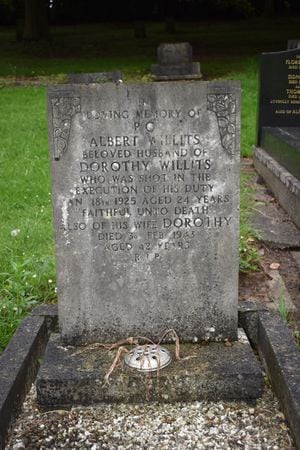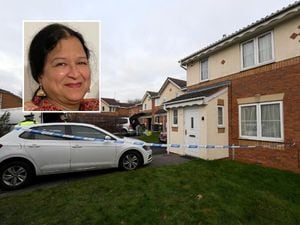Three shots which echoed down the generations
As bombs fell on the West Midlands during the Blitz, Mrs Dorothy Mountford did not join the rush to the shelters.
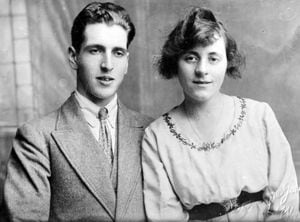
She stayed put, through depression and despair rather than defiance. And then, in 1943, she was found dead in a gas-filled room at her house in Botany Road, Walsall.
She is buried at Merridale cemetery in Wolverhampton, the inscription telling of tragedy during her life.
"In loving memory of PC Albert Willits, beloved husband of Dorothy Willits, who was shot in the execution of his duty, Jan 18th, 1925, aged 24 years. 'Faithful Unto Death.' Also of his wife Dorothy, died 3rd Feb 1943. Aged 42 years. R.I.P."

In a crime which was a sensation at the time, policeman Bert Willits was gunned down in a Wolverhampton street by teenage hoodlums who were sentenced to hang but escaped the gallows. Dorothy was left a young widow with their 10-month-old son, Derek.
There was a tremendous outpouring of public sympathy, a trust fund was set up, and the funeral was one of the biggest ever seen in the town.
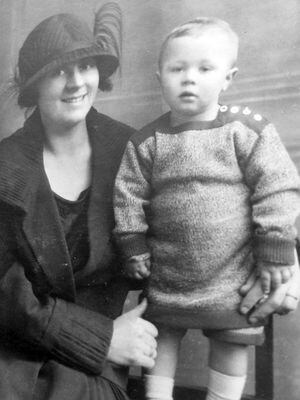
She remarried in 1927, and with Vic Mountford had two further children, Barbara and Alan. Yet on her death she was buried with her first husband.
Why? Eighty years on, nobody really knows. Nor does the family really know what caused her to end it all, although there are clues and theories.
It is not the original gravestone. That was, with others in the cemetery, vandalised, being knocked over and broken.
The cost of the replacement was shared between the Police Federation and Derek.
The inquest verdict was that Dorothy had taken her own life while her mind was temporarily unbalanced. She had developed mental health problems in 1937 but had seemed to get better.
No mention was made during the inquest of her being a policeman's widow.
Barbara Mountford is now 93 and living in Torquay, although she hails originally from Walsall.
Her daughter Ailsa Cox has been tapping into her memories for a book with the working title "Dolly"; Dolly being the name by which Dorothy seems to have been known.
"She said her mother took no pride in her appearance, and when the bombing was on the family would go to the bomb shelter but her mother would stay in the house, as if to say 'I don't care, just let the bombs get me,' which is just so traumatic," said Ailsa.
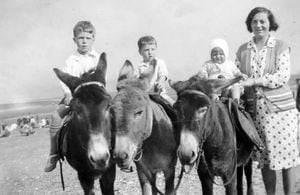
David Willits of Penkridge, 66-year-old son of the late Derek, said: "The official line, as told to me by my dad, was that she was expecting the release of the murderers from prison. She got worked up that they would come after my dad. That was the line given to me as to why she took her own life."
Although Bert's killers had been at liberty for some years at the time of Dorothy's suicide, her mental decline does seem to have started around the same time as they were released.
Other possibilities.
"We know that Vic was having an affair," says Sue King, David's older sister, from Otley in West Yorkshire.
"Dorothy died in the February and by June he had married this other woman."
Then there was her worry about teenage Derek, who had volunteered to join the wartime Royal Navy in 1942.
Ailsa says: "He had been on leave and had just gone back. She must have been so anxious about him. Having already lost her husband, someone in uniform doing his duty, you can imagine how traumatic that must have been."
Barbara has also mentioned to Ailsa that there might have been a miscarriage.
Dorothy, whose maiden name was Hughes, had married Albert Willits, known as Bert, in 1923. Both were from Walsall, and Bert had followed in the footsteps of his policeman father. Dorothy was a seamstress.
They lived in a Wolverhampton Corporation house on its Willenhall Road site. Bert joined the Wolverhampton police in July 1921 and was based at the Bilston Road police station.
His life was brutally cut short in a fatal encounter with three runaways in nearby Vicarage Road in the early morning darkness of Sunday, January 18, 1925.
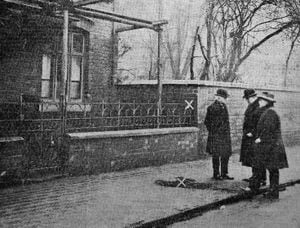
They were Jock Heggerty, 17, a waiter and a native of Glasgow, 19-year-old labourer Bill Crossley, of Carnforth in Lancashire, and Jimmy Dixon, a 14-year-old orphan.
They were inmates at the St Vincent de St Paul's Hostel for Boys at Leyton Green, Harpenden – a Roman Catholic probation home – but had absconded while on their way to confession and began making their way north armed with a revolver, which they thought would be useful when they broke into houses.
On their travels they fetched up in Wolverhampton where they were challenged several times by police, but said they were heading for Stafford and were allowed on their way.
Things came to a head in Vicarage Road at around 6.40am. Constable Willits spotted them and, rightly suspecting they were up to no good, moved in to collar them.
Three shots rang out and he fell dying. One bullet had grazed his temple, but the fatal shot had been to the back of his head.
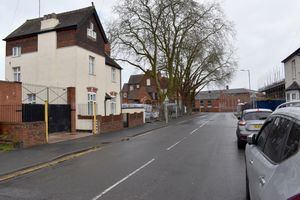
Exactly what happened in those moments will never be known as Crossley and Heggerty were to give self-serving accounts blaming each other.
At their trial Heggerty admitted firing one shot which missed. Crossley claimed Heggerty fired all three, and that was also the evidence of Dixon, who was a prosecution witness.
In fact, it did not matter who fired the fatal shot. As they were both in on it, legally they were both equally guilty of murder.
Immediately after the shooting a big manhunt was launched and the trio were picked up on the Stafford road near Stafford. They had got rid of the revolver on the way. Despite extensive searches, it was never found.
Bert's funeral was a massive affair, with thousands lining the streets to watch the cortege as it left the Willits' home and made its way to St Peter's Church, before moving on to the cemetery.
Widowed Dorothy did not attend.
"I don't think she was up for it, and looked after my dad. My Uncle Bill, her brother, attended on her behalf," said David.
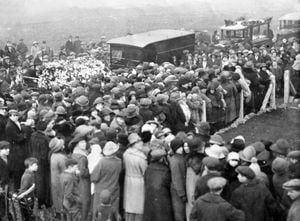
The court case was open and shut. Heggerty and Crossley were convicted of murder and on February 27, 1925, sentenced to death by Mr Justice Salter at Stafford Assizes.
There were petitions for them to be reprieved, and they bore fruit, as the death sentences were lifted by the then Home Secretary on April 1, less than a week before the pair were due to be executed.
As for Derek, he of course had no memory of his father, but would have given him every reason to be proud.
He served with distinction in the Second World War, taking part in the Sicily landings, the Salerno landings where he prepared the beaches, and serving on a tank landing craft during the Normandy invasion, supporting the Americans on Omaha beach a day or two after D-Day.
Having joined the Royal Navy as a rating, he rose to become a Sub-Lieutenant.
Home life however went downhill after his mother's death. When Vic remarried, his relations with the stepmother were so bad that he felt he had no choice but to leave home.
"My father could not get money from the trust fund until he was 21, but because of his domestic situation he was allowed to have it early. He and my mother Connie bought their first house with money from the fund. It was in Bloxwich," says David.
Incidentally under the terms of the fund Dorothy lost her right to benefit from it when she remarried, and a request in 1940 for her to receive income from it was refused.
However the money was used to give Derek music lessons, and a good education at Queen Mary's Grammar School at Walsall. He became a music teacher, teaching at Chuckery School at Walsall and the last 17 years of his career at Willingsworth High School at Tipton.
He was organist at St Andrew's Church, Birchills and before that was choirmaster and organist at Pelsall.
There is nothing in Vicarage Road to tell of those events of nearly 100 years ago, unless the bullet mark on a wall is still there, but in 1992 Derek and other family members were invited to the unveiling of a plaque at Wolverhampton's new police station in Bilston Street honouring the sacrifice of his father Bert.
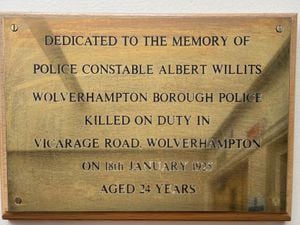
And with David he would go to the annual National Police Memorial Day service, held in different parts of the country, to remember those police officers who lost their lives while on duty.
Derek died six years ago.
Ailsa has done some digging to find what became of the killers.

She says: "Crossley was released in 1937. He moves to Liverpool, is given a job and a new name by a Catholic society and vanishes from history.
"In March 1938 Heggerty was released. The prison records show he was considered 'a self-satisfied young man' and I would infer that he was kept in jail a year longer to teach him a lesson. In 1946, as McNamara, he's jailed for three months for stealing four tablecloths from the Palm Court Hotel in Torquay where he was a waiter.
"He also admitted stealing cutlery from Lyons' Corner House. Perhaps because of the confession his licence isn't revoked, but it was a pretty stupid thing to do to risk going back to prison."
Jimmy Dixon, who was no angel, went to a workhouse and died young.
